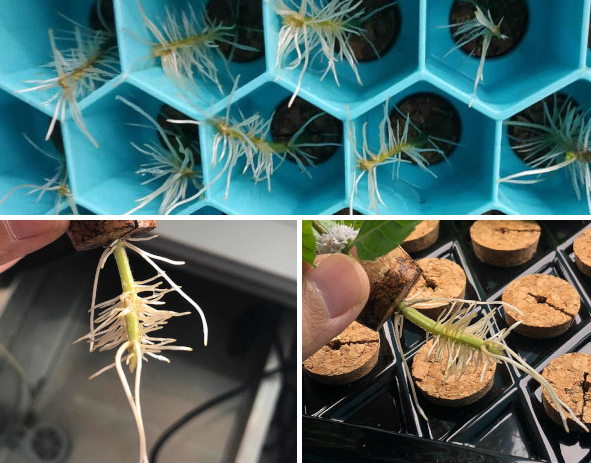There are many different ways to carry out plant cloning: tissue culture, plugs, rockwool, and so on. At the same time, more innovative technologies have been coming up over time, which made cloning much easier. One of the most interesting is aeroponic cloning, which has many benefits for large-scale growers, as it allows them to increase their efficiency, but not only. “In aeroponics, the roots do not require any growing medium,” Gilad Krakower, CEO of Quiclone, explains.
Aeroponic cloning
“In aeroponic cloning, water mixed with nutrients are sprayed directly to the roots, which are ‘suspended in the air,” Gilad continues to explain. “There are many benefits associated with the fact that no medium is used in such a cloning process. When using aeroponics, oxygen, nutrients and water are 100% available to the clones. This makes such a method not only environmentally friendly, as there is no wasted water or nutrients, but also more sustainable from a business standpoint.”
Gilad further points out that the very first thing that growers usually consider when it comes to cloning is the cloning area size and the labor costs: “The area size reflects on the ‘flowering area’, and labor cost reflects on an experienced worker, whom, in some farms, the whole operation depends on,” he observes. “This creates a situation in which the entirety of the farm depends on one person only for the success of the growth and of the business. That is why it is critical to have a system that is easy to use, and that relies on automation, so that everyone can utilize it.” That’s where the Quiclone’s automated system cloning system comes into play. “Our system provides an unparalleled level of automation in the cloning space, as it combines automation and aeroponics so to carry out the cloning process with ease while ensuring the best results,” he says.

Automated cloning system
Quiclone’s automated cloning system capitalizes on the benefits of aeroponics and automation to grow stronger and healthier clones, in a shorter time. “This because there is no dirt, soil, or anything that potentially slows down the plant’s water and nutrient uptake, as all the nutrients and water are fully available to plants,” Gilad points out. “Water and nutrients are indeed sprayed directly to the roots of the clones, which allows them to absorb everything they need, and thus they root faster.”
When it comes to large-scale cultivation, with growers having to prepare a lot of clones at once, relying on aeroponic surely is tempting, but can be quite challenging. That is why Quiclone has designed a completely automated aeroponic cloning machine that allows for utter control of the cloning process, giving growers a huge peace of mind. “On top of the benefits of aeroponic cloning in general, the Quiclone's automated cloning machine helps growers also save labor, as the machine takes care of everything by itself. Not only that: in our system, there are bio-degradable and transplantable collars that hold the stems of the cuttings, which allow to easily transplant them by just picking up the collars out of the tray; in addition, such a system allows to easily transport the clones in all safety, as you can use the transfer kit to keep medium around the clones. This is critical for all those operations that plan to export their clones, as no medium is allowed to export clones to other countries.”
Ease of use
Quiclone can clone cuttings with extraordinarily little input from the cloner since most of its operations are automated. “Adding water, adding pH solution to the dosing pumps, placing cuttings into the collars, and turning on the machine are the only hands-on activities a cloner needs to be concerned about,” Gilad explains. “On top of that, you can control and monitor the machine remotely, so that you can change and adjust the different variables according to the situation, but also and especially be sure that everything is running smoothly.” The Quiclone machine has also a power backup-battery that would save the clones in case of a power outage in the facility. “Growers would receive an email or SMS notification, thanks to the built-in cellular modem,” Gilad explains.
Gilad also points out that such an automated cloning machine is particularly useful to tissue culture labs, as the last stage of development in these operations is indeed the rooting. “Today tissue culture labs usually perform this stage in rockwool cubes or other medium,” he says. “Our machine provides a sterilized environment that makes this final stage much easier for tissue culture operators.”
Cloning generally speaking allows growers to rely on stronger and healthier plants; the Quiclone’s automated aeroponic cloning system adds on top of this the benefits of the aeroponic methodology, ensuring shorter rooting cycles and strong clones that keep the original genetic potential of the plant. “Combining this with an automated aeroponic cloning machine, growers can be sure that the success of their operation is already in their pockets,” Gilad concludes.
For more information:
Quiclone
+86 1888 942 8861
[email protected]
https://quiclone.com
